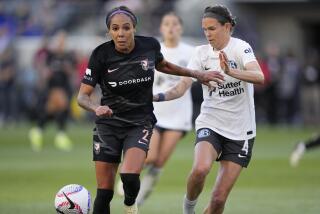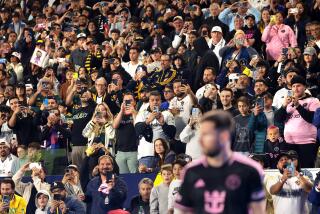USFL Owners Vote to Keep the Express Going
TEANECK, N.J. — THE HIGHLIGHTS
The USFL said the financially strapped Express would finish the season and then join the rest of the league when it moved to a fall schedule in 1986.
The league voted, 13-2, to move its season to the fall in 1986, opposing the NFL.
Tampa Bay Bandits owner John Bassett announced that his team, the USFL’s most stable and successful franchise, will split with the USFL and join a new spring league in 1986.
United States Football League Commissioner Harry Usher, emerging from the most important owners’ meeting in the league’s three-year history, announced here Monday that the financially strapped Los Angeles Express will finish the season and will then join the rest of the league when it moves to the fall in 1986.
The scheduling move was ratified even though the league does not have a major network contact.
The owners’ vote in the USFL’s decision to play in the fall was 13-2, with only Tampa Bay’s John Bassett and Denver’s Doug Spedding dissenting.
Bassett, angered over the decision, announced that his Bandits, the USFL’s most stable and successful franchise, will split from the USFL and become part of Bassett’s proposed spring football league in 1986.
He also predicted that the USFL’s chances of competing against the NFL in the fall are “very, very slim.”
But for the Express, Monday’s news was, at least for the time being, very good.
Express President Don Klosterman headed directly from the meeting to telephone Coach John Hadl and his players, who were awaiting word at the Express camp in Manhattan Beach.
“I could hear some of the players hooting and hollering in the background,” Klosterman said. “I told them that all they had to do was to win 10 games in a row to justify this commitment.”
Klosterman had said last week that he thought the struggling Express, which is being operated with league funds, might fold at Monday’s meeting. He told players of that possibility last Friday. Some cleaned out their lockers and played Saturday night’s game with the Portland Breakers as if it was their last.
But Usher said that the USFL would stand by its commitment and support the team through the 1985 season.
“This team is coming around,” Usher said of the 3-7 Express, “And will be around for years to come.”
Each of the 13 USFL owners has pledged $500,000 to keep the Express in business through the end of the season.
“I had to call my wife and cancel our 30-day notice,” Express linebacker Danny Rich said. “They were coming to pick up the furniture tomorrow. I’ll have to cancel that, too.”
Added Hadl: “We appreciate the owners spending money to make a commitment to this team. We’re going to be in the race before it’s over.”
Klosterman said that finding an owner in Los Angeles would be easier, now that the spring-fall issue has been settled.
“Prospective owners have come up to me and said, ‘Don, how can I even talk about losing $10 million when you’re not even sure when you’re playing?’ ” Klosterman said. “This showed a cohesiveness in the entire league.”
Well, not entirely.
Bassett, owner of the Bandits, was bitter about the decision to move to the fall. He distributed a 60-page report explaining the virtues of spring football.
The Bandits, compared to other USFL teams, have prospered in the spring and have no desire to compete against the NFL’s Buccaneers.
Spedding, who owns the Denver Gold, is of the same opinion, and he may join Bassett in his proposed spring league, which Bassett said would contain 10 or 11 teams in major U.S. markets and Canada.
The Gold averaged 33,000 fans a game last season. But when the USFL announced its fall plans in August, it affected attendance drastically. The Gold is averaging just 13,500 fans this season, clearly indicating which pro team fans in Denver would prefer.
“I’m probably taking the worst (financial) beating of all,” Spedding said.
There are other problems to consider. If the Gold and Bandits leave the league, who owns the players’ rights?
Usher said that the players have signed USFL contracts and are bound to the league.
Bassett doesn’t see it that way. “The last time I looked on my players’ paychecks, my name was on them, not his,” he said.
Spedding said he wasn’t sure what would happen.
Bassett was angry at the one-sidedness of the vote to play in the fall. He needed 10 votes to overturn the decision to move from fall to spring. He thought he had them.
“Nothing like a little peer pressure,” Bassett said, an obvious jab at Usher’s influence.
Bassett, though, predicts the doom of the league.
The USFL, in a vote of owners last August, decided to go head to head with the NFL in the fall of 1986.
But the USFL has not been able to get a network contact and will play the ’86 season without one.
ABC paid $15 million to the USFL in 1985 and has an option for the spring of 1986. But ABC said it would not pick up the option if the league decided to go to the fall.
Will the league survive?
“Yes, very well,” Usher said.
For the 1986 fall season, the USFL will receive $24 million as part of its three-year, $70-million deal with ESPN.
If the USFL reduces to 12 teams, which is likely, it would mean $2 million a team in revenue. Each NFL team receives about $15 million annually in television money.
Usher made mention of another potential television package, but he would not be specific. A source in the league said it involved a possible syndicated pay television deal with the creation of the USFL’s own television network.
USFL Notes Commissioner Harry Usher outlined the transition from spring to fall football. To ease them over the year’s layoff, 35 players on each club will be paid 30% of their salary from March 1, 1986 to July 1. The remaining 70% will be paid during the regular season. . . . The Birmingham Stallions, who are having financial problems themselves, were given until February, 1986 to pay their portion ($415,000) to aid the Express. . . . Usher also said that the league will go forward aggressively in its $1.32-billion antitrust suit against the NFL. . . . The first championship game of the USFL’s fall season is set for Jacksonville in January, 1987.
More to Read
Go beyond the scoreboard
Get the latest on L.A.'s teams in the daily Sports Report newsletter.
You may occasionally receive promotional content from the Los Angeles Times.











